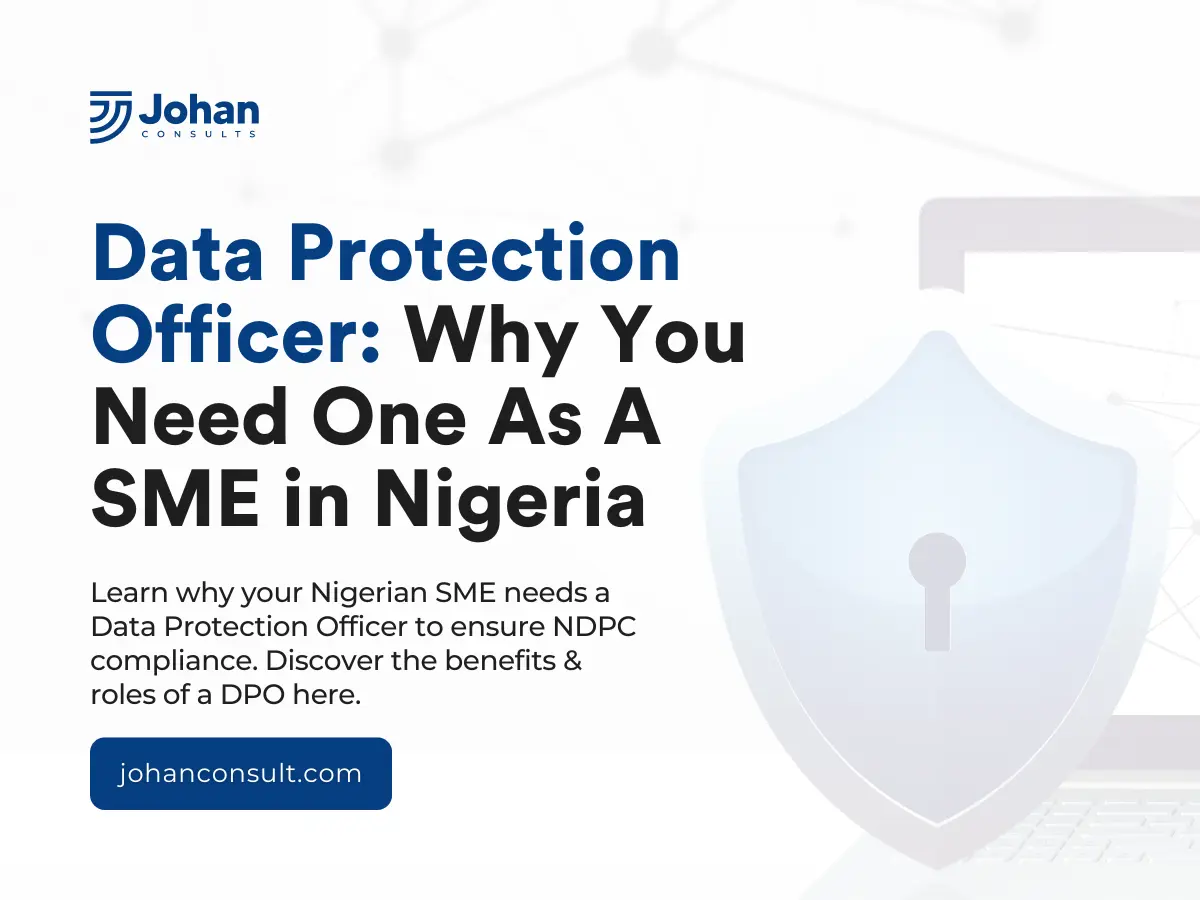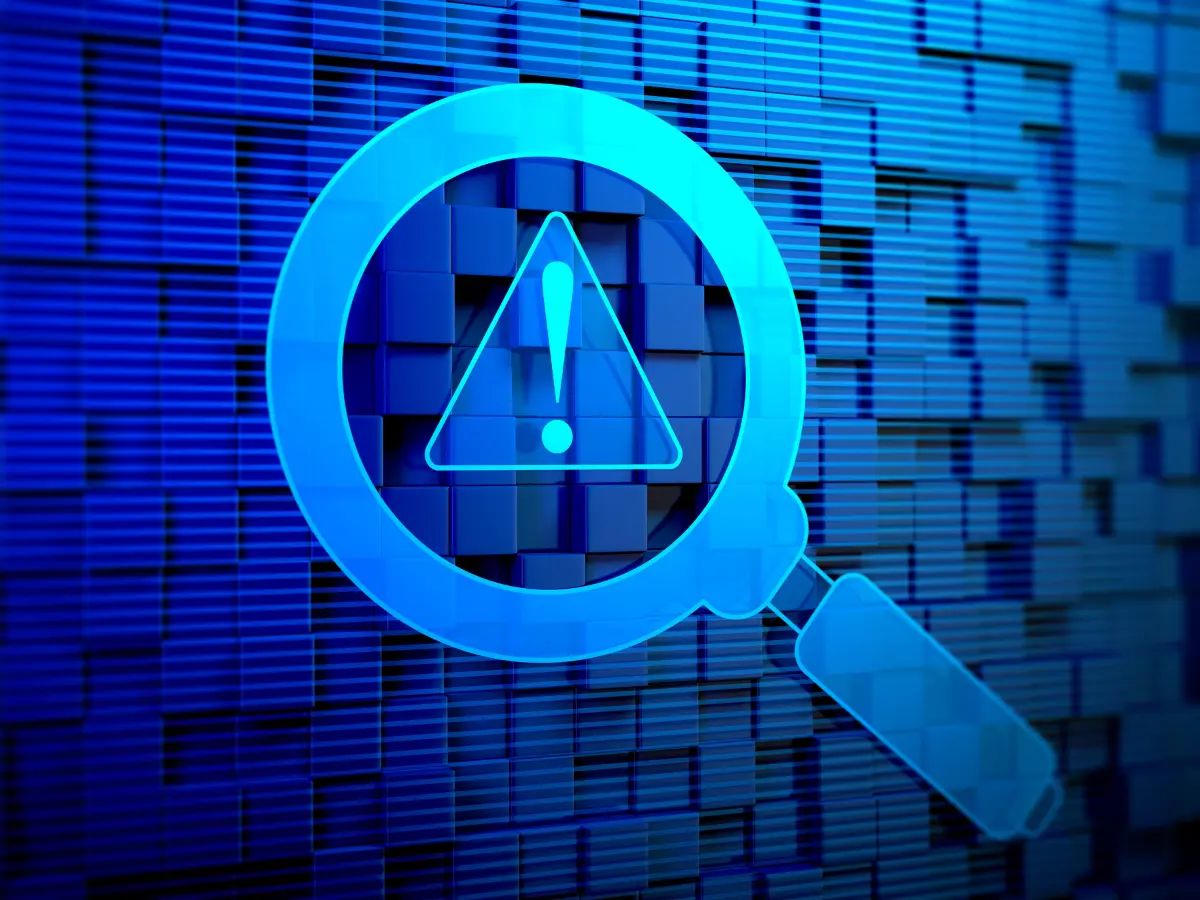As a small to medium-sized enterprise (SME) in Nigeria, running a business in this economy is tough. Every naira counts, and every decision feels like a tightrope walk. Between managing staff and staying ahead of the competition, there’s so much to juggle.

But here’s the thing: a hidden threat beneath the surface is a data breach waiting to happen. Data breaches are real, and small businesses are easy to target. So what can you do? That’s where a data protection officer comes in. A DPO helps your business follow the regulations stated in the data protection bill.
What is a Data Protection officer?
A data protection officer ensures an organization follows data protection laws and regulations. An example of this regulation is the NDPR or GDPR. These regulations help protect customers’ personal information from data breaches.
What is The Role of a Data Protection Officer in Business?
Below are a few things a data protection officer does:
- DPOs provide advice on how to complete data protection impact assessments. Data protection is a process that helps identify and manage risks
- They help to carry out assessments to ensure that all workers stick to NDPC
- DPOs ensure that they take a risk-based approach whenever a suspected breach occurs.
Benefits of Having A DPO As A SME in Nigeria
A report by Techcabal shows that Nigeria experienced a 64% increase in data breach in 2023. This is higher compared to 2022. With this increase, it’s clearly obvious that Nigerian businesses need a DPO to help protect individuals’ data.
Here are some benefits of having a data protection officer in your organization:
- Data Breaches Can Wreck Your Business
If hackers steal your customer info, it’s a big problem. Your company could face fines, and you could lose customers.
When this occurs, it might take ages to fix your reputation. Furthermore, data breaches can spread like wildfire online. At the end, your business will be hurt badly.
- DPOs Make Data Security Easy
A DPO helps you build a shield around your customer information. They create clear rules on handling data, train your staff on what to do, and check for weaknesses in your system. This keeps your data safe and saves you time and money in the long run.
- DPOs Help You Work Smarter
Having a lot of customer information can be both helpful and confusing. A DPO helps you organize it all, making it easier to find what you need. This saves time and reduces the chance of mistakes that could lead to a data breach.
- DPOs Make You More Trustworthy
Statistics show that 62% of people are more likely to do business with someone they trust. These days, people worry about who has their information. Having a DPO shows customers you take their privacy seriously. That can give you a leg up on the competition.
Does My Business Need A Data Protection Officer Under NDPC?

Knowing if you need a DPO as a business under NDPC depends on the nature of your data processing activity. Below is a breakdown of the key factors to consider:
1. Mandatory DPO Appointment
The NDPC states that any organization that falls under any of these categories needs to have a DPO:
- If you’re a public authority, for example, a government body. This doesn’t include courts
- Your business regularly tracks a large amount of customer data
- If your business handles special data like health information or religious beliefs
2. Voluntary DPO Appointment
Even if not mandatory, appointing a DPO is good practice if:
- Your business processes a significant amount of personal data. Especially for marketing or profiling purposes.
- Your business deals with a high volume of data subject requests e.g., access requests.
- You operate in an industry with a high risk of data breaches (e.g., finance, healthcare).
Requirements For Appointing a Data Protection Officer Under NDPC
If you’re an organization in Nigeria under NDPC , you aren’t allowed to just appoint anyone as your DPO. There are some requirements to be met before choosing a DPO. Here are some of them:
- For the registration of your DPO, you’ll have to submit the individual’s name and data privacy requirements. This is in line with section 32(1) of the Nigerian Data Protection Act.
- This section states, “Data controllers handling significant amounts of data must appoint a DPO with expertise in data protection law.”
- The DPO must have expertise in Nigerian data protection laws and practices.
- The DPO must have an in-depth understanding of applicable data protection laws.
Why Do SMEs Need A Data Protection Officer?
As a Small and Medium-sized Enterprise (SME) in Nigeria, you may think that data protection is only a concern for large corporations. However, as businesses increasingly rely on digital tools, SMEs face growing risks of cyberattacks.
Here are some reasons why SMEs in Nigeria need a Data Protection Officer:
1. Protection of Sensitive Customer Data
As an SME, you likely collect personal data from your customers, such as names, addresses, phone numbers, and financial information.
A Data Protection Officer can ensure that this data is properly secured and protected from unauthorized access, theft, or loss.
2. Compliance With Data Protection Regulations
Nigeria’s data protection regulations require businesses to appoint a DPO. This is to help oversee data protection practices. A DPO can help your business follow these regulations, avoiding costly fines and reputational damage.
3. Building Trust With Customers and Stakeholders
You demonstrate your commitment to data protection and privacy by appointing a Data Protection Officer. This can help build trust with your customers, stakeholders, and business partners. With this, your reputation and competitiveness are enhanced.
4. Mitigating Cyber Security Risks
A Data protection officer can help identify and mitigate cyber security risks. This helps to reduce the likelihood of data breaches and cyber-attacks.
This is particularly important for SMEs, which may not have the resources to recover from a major data breach.
5. Staying Ahead of The Competition
You can differentiate your business from competitors by prioritizing data protection and appointing a Data Protection Officer. You can also establish yourself as a leader in data protection and privacy.
6. Supporting Business Growth
A Data Protection Officer can help you navigate the complexities of data protection. This allows you to focus on growing your business.
By ensuring that data protection practices are in place, you can expand your customer base. You can also enter new markets and increase revenue.
How A DPO Can Help SMEs in Nigeria Build Trust With Customers and Stakeholders
As a SME in Nigeria, a DPO can help you build trust with customers and stakeholders by:
1. Demonstrating Commitment to Data Protection
As an SME business, appointing a data protection officer demonstrates your commitment to protecting private customer information.
This commitment is essential in building trust with customers and stakeholders. It also extends to employees, who are more likely to prioritize data protection when they see that their organization is dedicated to it.
2. Ensuring Transparency
A DPO can ensure that data protection policies and practices are transparent. This clarifies how customer data is collected, used, and shared.
By being open and clear about data protection practices, SMEs can demonstrate accountability and show that they have nothing to hide.
Transparency also helps to build trust with stakeholders, such as investors, partners, and regulators, who may have concerns about data protection.
3. Implementing Data Protection By Design
A DPO can ensure that data protection is integrated into products and services from the outset. This shows a proactive approach to protecting customer data.
Data protection, by design, involves considering data protection implications at every stage of product development. By doing so, SMEs can identify and mitigate data protection risks early on.
This helps to reduce the likelihood of data breaches and cyber-attacks. Data protection by design also shows that SMEs are committed to protecting customer data, which can help build trust and differentiate them from competitors.
4. Conducting Data Protection Impact Assessments
A DPO can conduct data protection impact assessments to identify and mitigate data protection risks. These assessments involve analyzing how personal data is collected, processed, and stored.
It also involves identifying potential risks to that data. By conducting these assessments, SMEs can demonstrate that they are proactive in identifying and mitigating data protection risks.
This can help build trust with customers and stakeholders. Data protection impact assessments also help SMEs to prioritize data protection measures, ensuring that they are focusing on the most critical areas.
Final Thoughts
A Data Protection Officer is essential for SMEs in Nigeria. They ensure compliance with data protection regulations and protect your business and customers’ data. They also provide a competitive advantage.
Furthermore, you can partner with a data protection service consultancy to ensure compliance and data protection. Don’t wait until it’s too late – appoint a DPO today and safeguard your business’s future.










